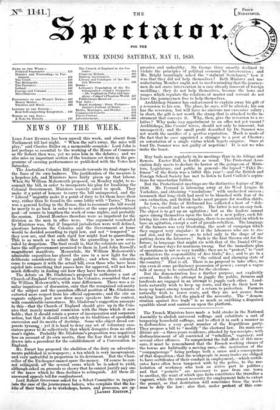NEWS OF THE WEEK.
LORD JOHN RUSSELL has been unwell this week, and absent from Parliament till last night. " When the cat's away, the mice will play," said Charles Buller on a memorable occasion : Lord John is not perhaps so essential to the working of the House of Commons as Sir Robert then was, yet we miss him in the debates ; and we also miss an important section of the business set down in the pro- gramme of ensuing performances as published with the -Votes last Saturday. The Australian Colonies Bill proceeds towards its final stages by the force of its own badness. The justification of the measure is a hopeless job, and Ministers have fairly given up that labour. When, Sir NVilliam Molesworth proposed, on Monday night, to re- «mina the bill, in order to incorporate his plan for localizing the Colonial Government, Ministers scarcely cared to speak. They ' make it a point of honour to carry the bill unimproved, and the -" Liberal " majority make it a point of duty to let them have their way,rather'than be found in the same lobby with " Tories." There was a general feeling in the House, that to recommit the bill would be merely to go back in order to arrive at the same predetermined goal--of course to lengthen the work of some nights, and probably the session. Liberal Members therefore were as impatient for the division as the men in office were. One argument vouchsafed by Ministers was, that if Imperial jurisdiction were well defined, questions between the Colonies and the Government at home would be decided according to rigid law, and not " tempered" as they now are, and that such rigid law might lead to quarrelling. This is as much as to admit that the quarrelling is now over- ruled by despotism. The final result is, that the colonists are not to have the self-government promised to them in Lord John Russell's magnificent manifesto. Meanwhile, Sir William Molesworth's admirable exposition has placed the ease in a new light for the deliberate consideration of the public ; and when the colonists come to compare it with the actual bill, even those who have been cajoled into something that passes here for approval, will not have much difficulty in finding out how they have been cheated.. The debate on Mr. Gladstone's proposal to authorize a sort of Church-of-England Convocation in the Colonies, resembled that on -Sir William Molesworth's, with some differences. There was a si- milar impatience of discussion, only that the recognized solemnity of the subject and the quondam official position of Mr. Gladstone extorted more respect from his official opponents ; and the stir on cognate subjects just now drew more speakers into the contest, with considerable earnestness. Mr. Gladstone's suggestion amounts to this--that the Church of England should give up in the Colo- nies that merely nominal connexion with the State which it now holds ; that it should retain a power of incorporation and corporate action, but that it should rest solely on its traditions of apostolioal _succession and its merits of doctrine. Some who object dread cor- porate tyrannz: yet it is hard to deny any set of voluntary asso- motors power to do collectively that which derogates from no other
• man's rights. Probably Mr. Gladstone's proposition was negatived less on account of its own merits, than the fear that it might be drawn into a precedent for the establishment of a Convocation in England. Mr. Evart has proposed the abolition of the duty on advertise- ments published in newspapers ; a tax which is very inconvenient, and very unfruitful in proportion to its detriment. But the Chan- cellor of the Exchequer cannot spare the money. Of course he can- not relinquish all the several sums which he is asked to yield, although asked on grounds so showy that he cannot justify any one of the taxes which he thus declines to relinquish. All these ill- answered appeals tell for readjustment. Lord Robert Grosvenor asked for a Select Committee to inquire into the case of the journeymen bakers, who complain that the ha- bits of their bide, as to workshops, hours, and processes, are op- [Laren EDITION.] pressive and unhealthy. Sir George Grey smartly declined to violate the principles of political economy by intervention ; and Mr. Bright tauntingly asked the " stalwart Scotchmen," how it was that they did not help themselves ? Both Minister and ma- nufacturing Member ought not to need reminding that the journey- men do not crave intervention in a case already innocent of foreign meddling • they do not help themselves, because the laws and usages which regulate the relations of master and servant do not leave the journeymen free to help themselves. Archbishop Sumner has endeavoured to explain away his gift of a reversion to his son. The place, he says, well be altered; bus son has the reversion, but will have no sinecure nor excessive salary ; in short, the gift is not worth the stamp that is attached to the in- strument that conveys it. Why, then, give the reversion to a re- lative? Why make any appointment to an office not yet vacant? Archbishops, like Caesars' wives, should not only be innocent, but unsuspected; and the small profit described by Dr. Sumner was not worth the sacrifice of a spotless reputation. Much is made of the fact that he once appointed a stranger to a post at Chester; an ostentation of a single virtue which begets surprise. Once at least Dr. Sumner was not guilty of nepotism ! It is not we who make the boast.


























